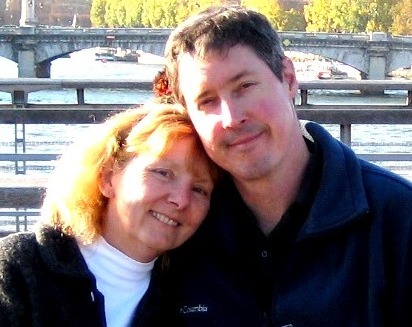
On the cusp of spring in 2005, Dave Collins recalls looking out over the marsh in his Old Lyme backyard through tears early one morning and wondering, “How many more sunrises will I see?” This emotional moment was the culmination of a tumultuous one-week period during which a tumor was detected in Collins’ colon and it was confirmed that it had metastasized to his lungs and liver. He was told he had stage-4 colon cancer. He was 48 years old.
Nine years later, Collins is in his sixth year of living cancer-free. For him and his wife Kathy, the three-year ordeal of surgeries and treatments was grueling and stressful, but by sticking together and clinging to positive outlooks, along with the right treatments from good doctors, he beat the grim odds. And, by his own admission, he needed a dose of good luck.
His medical odyssey began in 2004, when Collins started to notice some blood during bowel movements. An initial screening by medical practitioners speculated that, because it was a small amount and bright red, it was probably from hemorrhoids. The blood would only appear every couple of months, Collins says, so he kept monitoring it on his own. Then one day while at work in March of 2005, he experienced a sudden discharge of a significant quantity of blood through his rectum and left immediately to go to a doctor.
A sigmoidoscopy done on the spot in a gastroenterologist’s office identified a large tumor in the lower portion of his colon. Some blood was also drawn to measure its CEA level. [CEA (Carcinoembryonic antigen)is a type of protein molecule that can be present in different cells and a high level can be an indicator of a tumor.]
A few days later Collins went to the Middlesex Hospital’s clinic in Essex for a CAT scan and to get the results of his blood test. His blood revealed a distressing number. A normal range for CEA is 0-5. The level in Collins was 427. “The doctor said it was the highest level he had ever seen,” Collins recalls, continuing, “It indicated that there was a high chance that I had colon cancer.”
The CAT scan indentified more than two-dozen tumors in his liver. A biopsy confirmed cancer. A subsequent chest x-ray detected one tumor in each lung. “Talk about shock,” Kathy says, adding, “I was numb.”
“Initially, when we thought it was only in one location, we thought maybe this is something that’s beatable,” Collins remembers. “But when they said it was in both lungs and loaded in the liver, then we knew we were in trouble.” It really hit him hard when he asked his oncologist if he had other patients with the same diagnosis and he answered, “Yes, quite a few.”
When Collins asked how many of them survived, the doctor was evasive. “So I said to him, none of them made it, right?” And the doctor said quietly, “Correct.” Collins responded, “Well, I guess I’ll have to be your first one.”
“I still get chills when I think about that moment,” he says. “That was very emotional for me. That’s when we came home and just sat on the sofa and hugged each other and cried.”
“It was very surreal,” Kathy added. “Keep in mind all this was in the space of a week. It all occurred between March 17 and March 25 (2005).”
When asked if he felt defeated at that moment, Collins says, “I felt really scared at that point, and really emotional. I don’t think there was ever a time when I felt defeated, but I also never felt there was a time when I felt I’m going to beat this or felt cocky. We went into the mode of, let’s be smart about this, let’s play our cards as best as we possibly can.”
But Collins says he also felt a conflict between what he would think or say and what he felt in his heart. “I was trying to get myself on a mentally positive track. In my mind I was thinking I should try to be positive but my heart was not really believing that.” Echoing that conundrum, Kathy added, “I don’t think either one of us wanted to accept that it couldn’t have a positive outcome.”
Kathy says that Dave’s oncologist, Dr. Robert Levy of Middlesex Hospital, was very honest with him. While he was never so blunt as to say Dave only had a short time left, he said that with cancers as advanced as his, there are no guarantees.
Right from the beginning, Kathy had the foresight to begin keeping a notebook and log, writing down everything as it was occurring. It became a running diary of the entire experience. Dr. Levy supported and enabled this, she said. Every visit to any doctor included note-taking so they would not have to rely on their memories once they got home; memories that were inevitably clouded by stress.
Collins says this was invaluable. “When you’re in an emotional state, it’s hard to remember or process the information that your doctors are giving you. A lot of times I would think the doctor said one thing, then Kathy’s notes would show something different. So it’s really important for someone to be with you and take notes.” Questions that either of them thought of between visits would also get jotted down immediately. “It was important for us,” Kathy says, “because it gave us a sense of control in a situation where we clearly had no control.”
Many Surgeries and Chemo Treatments
The steps to cure Collins’ cancer were a very prolonged, meticulous series of surgeries and treatments that began with removing the colon tumor in April 2005. A resection, as it’s called, removed about six inches of his lower colon where the tumor was and reattached the ends. That enabled his “plumbing,” as he puts it, to be put in good functioning order. A few weeks later he began a 10-month regimen of chemotherapy.
The chemo protocol was designed at Memorial Sloan-Kettering Cancer Center (MSKCC) in New York to treat the extensive cancer cells throughout his body and keep them from spreading further. How his body reacted to this chemo would determine whether surgery could be performed on his liver and lungs. If it didn’t shrink some of his tumors, his condition would be terminal. Collins’ oncologist, Dr. Levy, says, “I have treated many stage-4 colorectal cancer patients. When the cancer has spread to both the liver and the lungs, surgery is typically not possible and the cancer is considered incurable.”
 Throughout the 10 months, Collins wore a portable “fanny pack” in between treatments at an infusion center (see photo at left.) This contained the chemo drug and a small pump that fed a measured dose through a catheter into a port in his chest at regular intervals. With this pack attached, he began to exercise by jogging and riding an exercise bike. [Implantable ports are very small ports that are surgically inserted under the skin that receive a catheter tube carrying the chemo drug.] The chemo proved effective and a month after the treatments ended, Collins underwent surgery on his liver and lungs in March 2006.
Throughout the 10 months, Collins wore a portable “fanny pack” in between treatments at an infusion center (see photo at left.) This contained the chemo drug and a small pump that fed a measured dose through a catheter into a port in his chest at regular intervals. With this pack attached, he began to exercise by jogging and riding an exercise bike. [Implantable ports are very small ports that are surgically inserted under the skin that receive a catheter tube carrying the chemo drug.] The chemo proved effective and a month after the treatments ended, Collins underwent surgery on his liver and lungs in March 2006.
A small tumor in one lung was killed with the chemo, but a larger one in the other lung required surgery to remove. His liver had four tumors in the smaller left lobe. The right lobe had two-dozen tumors. The tumors in the left lobe were surgically removed. The right lobe was deemed inoperable. The only possible method of eliminating the pervasive tumors was a little-used procedure known as a liver resection. This required tying off the blood supply to the right lobe for a month, causing it to shrink and die. Such a procedure is possible because the liver will regenerate itself to compensate for the removed portion.

The right lobe was removed from his body a month later, and soon Collins began to experience side effects from that procedure, including infections along the incision and fevers. This required frequent return visits to MSKCC over a three-month period. In between those visits, Collins’ wife Kathy, with some training from the nurses, became a de facto nurse. Twice a day she uncovered his dressings and carefully removed any infected bits of flesh, rinsed the incision, and repacked the dressing. Collins describes these session as pretty intense, comparing them to painful stabbing by a needle.
By the fall of 2006, the incision had healed and Collins found himself facing another nine-month round of chemo. Side effects during this period included, he recalls, “Hypersensitivity to cold, burning sensations in my fingers,” that could be triggered simply from grabbing a can of soda from the refrigerator. He also experienced random periods of numbness on the bottom of his feet that affected his balance. “If I closed my eyes, I would immediately fall over. To me this was humorous, not frightening.”
Determined to rebuild his physical condition despite his ordeal with chemo, Collins routinely jogged, rode an exercise bike, and even returned to the tennis court, a game he regularly played before the onset of his cancer.
But there was more. When another tumor was identified in his left lobe, a third liver surgery was necessary in February 2008. After that, yet another round of chemo went from March through September. This time it was injected by a pump similar in size to a hockey puck that was implanted under the skin on his belly. This fed a highly concentrated dose directly into the liver and effectively put him into remission. Collins was told that if there is no recurrence over five years, the odds are good to stay cancer-free. If no recurrence after 10 years, it is unlikely that it will return. Now in his sixth cancer-free year, the odds are turning in his favor.
That wasn’t the end of his medical travails. During a visit with Dr. Levy, in June of 2010, a murmur was detected in Collins’ heart. Further diagnosis found that one of the chordae, or “heart strings,” that help to control heart valve function, had broken. Medical opinion was this might have been a consequence of the intense chemo. This led to open-heart surgery in December 2010, at Mt. Sinai Hospital in New York, to repair the strings of the mitral and tricuspid valves. Since that time Collins has no murmur and no valve leakage.
Good Attitude, Good Doctors and Some Luck
Everyone has his or her own way of dealing with adversity. Throughout his arduous ordeal, while his wife sometimes prayed, Collins never followed suit. Instead, he drew hope from the study of scientific journals and medical Web sites — perhaps a result of his engineering background. He also attributes his successful recovery to a generous dose of good fortune and luck. “It’s not all in doctor’s hands. Everyone had to play their cards as best they could and then hope for a successful outcome. There’s a huge element of luck. I was lucky to get exceptional doctors and lucky I responded well to chemo.”
To someone who is newly diagnosed or now beginning treatment, he urges studying and learning as much as you can. Find out where the ‘center of excellence’ facilities are and glean all you can from them. Establish which is the top hospital for your particular condition? Search the Internet for clinical trials of your specific form of cancer.
Collins continually reached out, asked questions and sought advice wherever he could. “I did a lot of research. I would ask each doctor to explain the reasoning for his approach. Don’t take your doctor as infallible. Don’t just rely on him. Do your own research and develop questions. If something does not make sense to you, challenge the doctor.”
He speculates that this extra effort might result in better care. “When doctors see how knowledgeable you are, they respect and appreciate it and may give your case a little extra thought and attention. I’m grateful, respectful, and appreciative of my doctors.”
Collins emphasizes that as important as the doctors are, having a personal caregiver and advocate is crucial. After talking for several hours with the Collins’s, it was clear that his wife’s loving care might have been as important as any doctor or treatment. Dave says the love and support that Kathy provided is immeasurable and this experience moved their relationship “to a new level and made us closer.”
“How beautiful is someone who sits beside you on a backless stool during five hours of chemo treatment – who attends to your every need and whim – treatment after treatment after treatment? How beautiful is someone who sleeps on a cot beside you in the hospital room – so as to be there – to not leave your side? How beautiful is someone who gives you foot massages and washes your hair and holds your arm when you can barely stand up and take a step? How beautiful is someone who does this continually for over four years, never once complaining – not once – who continually seems happy to do whatever will help get you through the day?”
“This total support from my wife spoke to me silently and continually – a wordless message that connected straight to my heart. It said: ‘I want you to recover, I want you to stay with me, I want you to come back to me and be with me.’ This message definitely got into my heart and I feel it somehow resonated with my DNA – creating sort of a well of strength or energy that I could continually draw from. I was many times physically depleted but I never once felt emotionally weak or defeated.”
Collins says that during the first few years of his battle, those sunrises became spiritual and precious. “I would sometimes get up early and watch sunrises like they were rare, sacred events. During this time, hearing the Cat Steven’s song Morning Has Broken was very emotional to me. Deep inside I realized that I very probably would not have the amount of time on earth that I wanted – that I thought I would have. [But] I never said anything to anyone about loving life or missing life or my fear of dying. I never let Kathy see me cry at a sunrise.”
“Now,” he says, “if I get angry or frustrated or moody, I simply tell myself: do you realize how lucky you are to be alive?”
What an inspiring, beautifully written story! It speaks volumes to all who face any and all earth shattering trials and tribulations. Life is full of them. This well written story tells you the bottom line; positive thinking, research, endurance, loving support, inner strength and a willingness to do what is necessary to survive and move on with ones life. A must read for all.
Congratulations to Dave and Kathy Collins. Wishing you many more years of health and happiness.
Absolutely a stunning read. Well done, Tom, you really brought this struggle to light and I was mesmerized by every word. I am praying for his continued recovery and I thank you for your unique ability to bring this story to life.
What a wonderful article about a courageous man and his family. Who says miracles don’t happen?
Dave… I am so happy to hear your pulled thru this..Someone is really watching over you..
This article is inspiring. My husband and I have been in a similar battle for a year now with Ray’s diagnosis of metastatic esophageal cancer. He has had brain surgery, radiation and chemo treatments since last September 22nd. It has been an emotional roller coaster for us and our family. I’m glad to hear of Dave’s remission and I pray for a good result for us, too.